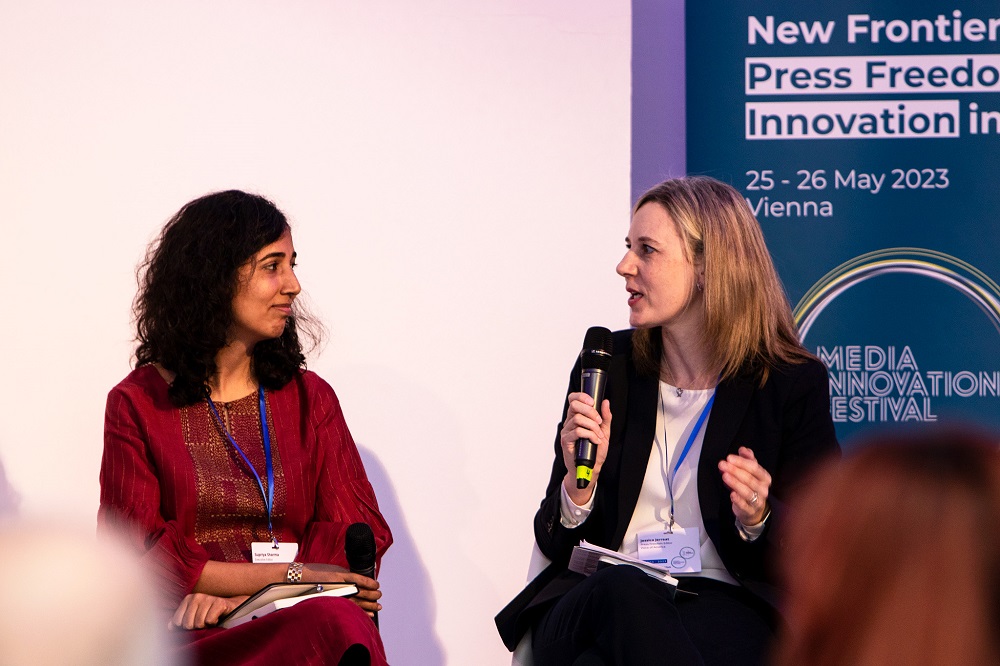With democracy under pressure globally, journalism faces growing hurdles to upholding the public’s access to independent news during pivotal election periods, editors from five countries — Turkey, Brazil, Kenya, Poland, and India — told the 2023 IPI World Congress.
In media landscapes around the world, common themes emerged throughout the May 25 panel, titled “Journalism in Democracies Under Pressure”, moderated by Jessica Jerreat of Voice of America.
A key challenge is growing media capture, which involves governments co-opting media to serve political interests, often in cooperation with business allies, and how it has squeezed the ability of independent media to reach a wide audience, especially around election cycles.
Şebnem Arsu, a reporter at Der Spiegel in Turkey — where President Recep Tayyip Erdoğan just narrowly won re-election despite a united opposition — told the Congress that 95 percent of the media in the country are directly or indirectly controlled by the government, allowing Erdoğan’s AKP party to steer the narrative.
This phenomenon is most notable in more rural areas, outside of big cities like Istanbul and Ankara, where the majority of people exclusively get their news from TRT, the state-controlled television network.
India and Poland increasingly find themselves in a similar situation of media control.
In India, Supriya Sharma, executive editor of Scroll.in, described media capture as one of the biggest challenges to press freedom in the country. Most mainstream media in India, she said, amplifies the government’s narrative and acts as a “hound dog” against independent, critical voices – often including independent newsrooms.
Aleksandra Sobczak, who serves as deputy editor-in-chief at Poland’s Gazeta Wyborcza, described a two-pronged method of media capture used by the government, led by the Law and Justice (PiS) party. First, shortly after PiS came to power in 2015, editors and crew at the country’s public broadcaster were removed and replaced by family and friends of government leaders, she said. The broadcaster is now an example of what Sobczak calls “hard” propaganda. But when this proved insufficient, a tactic of “soft” propaganda was implemented alongside. The government, through Poland’s state-controlled energy company, bought 500 local media outlets — some print, some digital — and has used these outlets to more subtly push the government’s messages.
“There is free, independent media in Poland.” Aleksandra Sobczak, Deputy Editor-in-Chief of @gazeta_wyborcza, shared what she sees as good news for media in Poland. “We are not the majority for sure… but we try to check what the government does.”#IPIWoCo pic.twitter.com/pcFAJm5uyK
— IPI – The Global Network for Independent Media (@globalfreemedia) May 25, 2023
The role of the media
In addition to media capture, some of the panelists also discussed the role of independent media in responding to propaganda, disinformation, and attacks on truth, which increasingly arise in election periods and threaten democracy.
One important lesson was highlighted by Paula Miraglia, the CEO and co-founder of Nexo Jornal in Brazil. “We need to call things by their names. When a politician says something that is a lie, we need to call it a lie.” She also spoke on the hesitancy of outlets in Brazil to call Bolsonaro’s government “far-right,” and how to report on the issues of politicians without giving them an undue platform.
In last year’s elections in Kenya, Asha Mwilu, founder and managing partner of Kenya’s youngest newsroom, Debunk Media, said that “the media was largely a spectator in this election,” diminishing the agenda-setting role of the press. She tied this to actions taken by main newsrooms in the 2013 and 2017 elections, in which media outlets and owners picked parties or candidates of choice.
This also disincentivized politicians from engaging with independent media. For example, Mwilu added, in presidential debates in the 2022 election, the incumbent candidate did not even show up.
However, for their part, both Sharma and Sobczak expressed a sense of hope for press freedom — noting that a free, independent press does continue to exist, and that there is still a segment of society, though small, that is open to hearing voices and views that conflict with their own.



